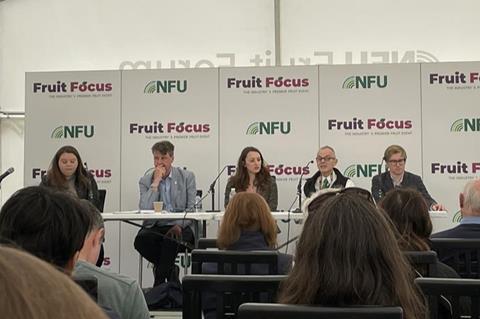Ali Capper calls on the Chemicals Regulations Division to create new legislation on chemicals and pesticides that better protects future of UK crops

The NFU Fruit Forum panels at this year’s Fruit Focus saw industry leaders discuss crop protection, sustainable pesticides and future innovation in farming.
One of the debates offered insight into the regulatory future of crop protection and how the UK may adapt under a new government.
Ali Capper, who chairs Horticulture Crop Protection (HCP), spoke on incoming horticultural policies and how best to adapt them to benefit farmers. She said new laws on crop proetction should focus on “risk over hazard management”.
Capper explained: “We previously had a government that would rather import food and have that risk somewhere else. Currently, we don’t know what this new government is going to deliver.”
She noted that the Chemicals Regulations Division (CRD) must create new legislation on chemicals and pesticides to better protect the future of UK crops.
Capper also empahsised the need to create a better regulatory environment to attract more innovative companies from other countries into the food safety sector.
“Whilst we’re a pinprick on the global stage, nobody’s going to want to invest the money in our market yet. We’ve got to demonstrate that there is a market for growers here in the UK,” Capper said. However, it may take some time to achieve this.
Fruit Focus took place on 10 July at NIAB’s HQ in East Malling, Kent. The panel discussions also featured industry figures from the NFU, such as horticulture and potato board chairman Martin Emmett and senior regulatory affairs adviser Chris Hartfield, as well as Richard Hopkins, chair of the Agricultural Industries Confederation (AIC).
New government, new challenges
Considering the recent refresh in government and the introduction of new MPs who may be less experienced in the horticultural and agricultural sector, Hartfield said “there was always going to be a fresh start”.
Richard Hopkins added: “We must question the new Secretary of State for environment, food and rural affairs, Steve Reed, and ask him what his emphasis is going to be. Whether it’s on food production, the environment, sustainable housing or whatever else, they must put together a clear case that squares the circle.”
Martin Emmett said that crop protection is a particularly politically sensitive area, as “there is a lot of NGO activity.”
He continued: “I think what we must do is have a very focused message based on constructive scientific argument, because just simply making noise isn’t going to cut it.
“Across this new government, we are ultimately going to face a lot of change. You would expect those new MPs in rural constituencies to be exceptionally mindful of the major issues affecting the sector.
“It’s now about rebuilding the dialogue and laying the groundwork for the future,” he concluded.
The future of biopesticides
The speakers stressed the need for sustainable pesticide use, emphasising the importance of evaluating the effectiveness and safety of biopesticides.
Hopkins explained: “The CRD are locked into a copy and paste process that uses synthetic chemistry. This is fundamentally inappropriate for biopesticides. They need to consider microbial eco-toxicity testing methods.”
Hopkins also emphasised that a more holistic approach to pesticide use is needed, including the use of professional products and qualifications for their application, to ensure their sustainability and safety.
“To use these professional products, you need qualifications to spray them, to advise on them, and are subject to yearly inspections when storing them,” he said. “However, companies within AIC, such as the distributors, are all up against internet sellers who don’t abide by any of these regulations.
“This has caused genuine concern that products made available on the internet are being shipped by couriers who don’t necessarily know what they’re delivering.
“They’re also being bought by people who aren’t qualified to use them. This is bad for the industry, as if a major incident occurs, we will all be blamed for it. Therefore, we really must clamp down on those internet sellers.”


